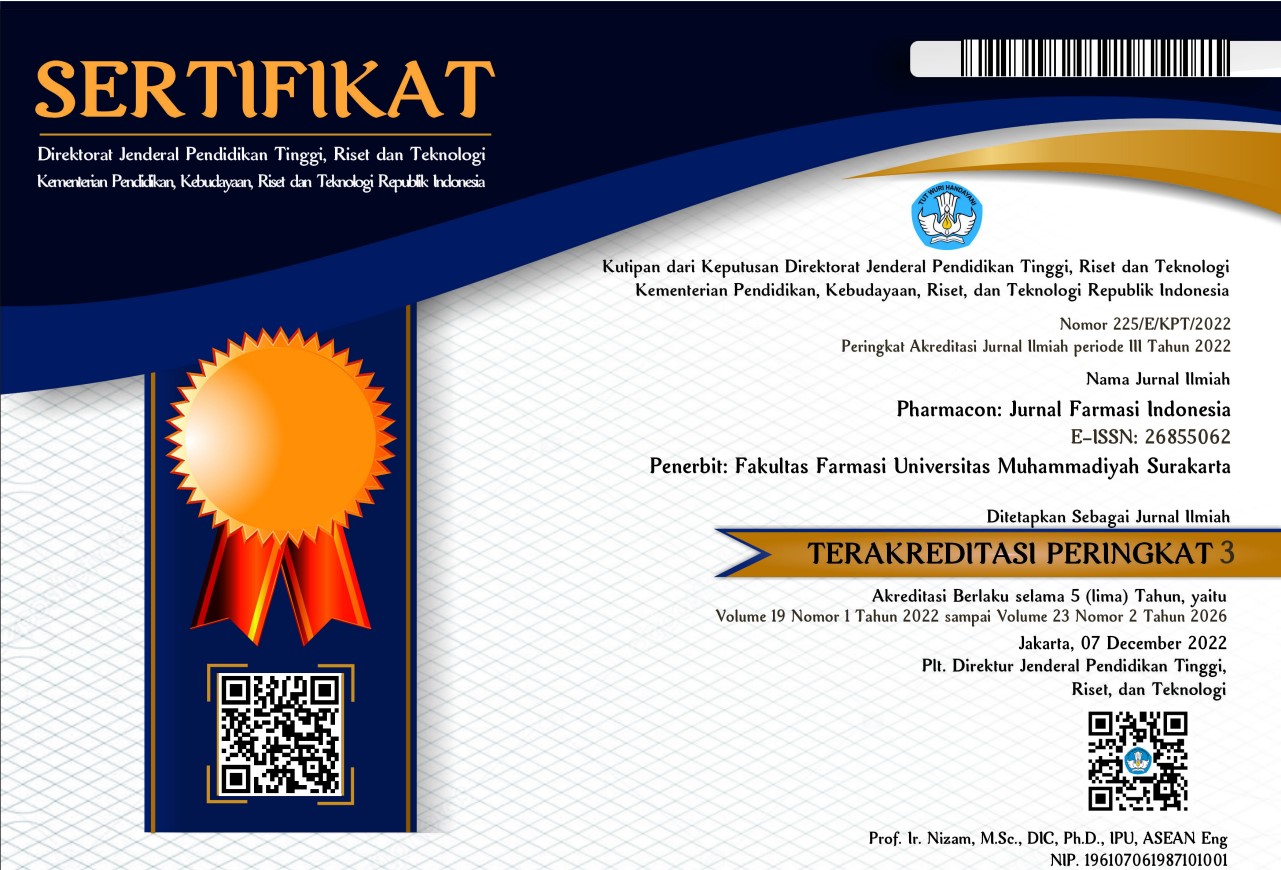The Potential UV-B Filter of Gel Preparation Containing Ethanol Extract of Bidara Arab Leaf (Ziziphus spina-christi) Cultivated in Indonesia
DOI:
https://doi.org/10.23917/pharmacon.v22i1.7487Keywords:
Bidara leaf, Gel, In vivo, In vitro, SunscreenAbstract
Bidara arab leaf (Ziziphus spina-christi) contains flavonoids, saponins, triterpenoids, alkaloids, steroids, and lipids that may act synergistically as natural UV filters. Flavonoids are highlighted for their ability to absorb UVA and UVB light, while other compounds may enhance photoprotection. Previous studies reported that its ethanol extract contains 1.53% flavonoids and exhibits strong antioxidant activity (LC₅₀ = 90.96 ppm). To formulate gel preparations containing Bidara Arab leaf ethanol extract and evaluate their physicochemical properties, sun protection factor (SPF), and photoprotective efficacy against UV-B–induced erythema. The extract was incorporated into gel at concentrations of 2.5% (F1), 5% (F2), and 10% (F3). Physicochemical tests included organoleptic assessment, pH, viscosity, and spreadability. In vitro SPF was determined using UV-Vis spectrophotometry. In vivo testing involved UV-B–irradiated mice, and erythema was scored to assess protection. All gels met standard parameters (pH 5.34–6.51; viscosity 10.352–15.459 cP; spreadability 5.2–5.8 cm). SPF values were 19.26 (F1), 20.22 (F2), and 20.50 (F3), indicating medium UV-B protection. Erythema scores in all extract-treated groups were 0, with erythema areas of 0.50 mm², 0.38 mm², and 0.19 mm², respectively—significantly lower than in the blank gel (3.96 mm²) and untreated control (7.51 mm²) (p<0.01). Bidara arab leaf extract gel (2.5–10%) shows medium SPF protection and effectively prevents UV-B–induced erythema in mice. These findings support its potential as a natural sunscreen agent.
Downloads
References
Asgarpanah, J., & Haghighat, E. (2012). Phytochemistry and pharmacologic properties of Ziziphus spina christi (L.) Willd. Afr. J. Pharm. Pharmacol, 6, 2332–2339. https://doi.org/10.5897/AJPP12.509
Cefali, L. C., Ataide, J. A., Moriel, P., Foglio, M. A., & Mazzola, P. G. (2016). Plant‐based active photoprotectants for sunscreens. International Journal of Cosmetic Science, 38(4), 346–353. https://doi.org/10.1111/ics.12316
Dewanti, D. A. P. S. I., Ernawati, D. K., Indrayani, A. W., Dewi, N. W. S., & Jawi, I. M. (2020). Protective Effect of Lemon (Citrus limon L.) Ethanol Extract Cream as an Antioxidant Against Exposure to Ultraviolet B Rays in the Skin of Male Wistar (Rattus norvegicus) Rats. Jurnal Epidemiologi Kesehatan Komunitas, 5(1), 8–14. https://doi.org/10.14710/jekk.v5i1.6910
Golmohammadzadeh, S., Imani, F., Hosseinzadeh, H., & Jaafari, M. R. (2011). Preparation, characterization and evaluation of sun protective and moisturizing effects of nanoliposomes containing safranal. Iranian Journal of Basic Medical Sciences, 14(6), 521–533. https://pubmed.ncbi.nlm.nih.gov/23493792/
Haeria, H., & Andi, T. U. (2016). Determination of Total Flavonoid Content and Antioxidant Activity of Ethanolic Extract of Bidara Leaves (Ziziphus spina-christi L.). Journal of Pharmaceutical and Medicinal Science, 1(2), 57–61. https://lnk.ink/OVh0h
Hendrawati, Aziza, La Ode Sumarlin, & Yulyani Nur Azizah. (2020). Formulation, Antioxidant And Antibacteria Activities Of Peel-Off Gel Mask, Enriched With Bidara Leaf (Ziziphus Spina-Christi L.) Extract. Geomate Journal, 18(68), 66–72. https://geomatejournal.com/geomate/article/view/544
Indriarini, L., Rahmasari, D., Savira, M., S.A., D. A., Bayu A., Y. N., & Chasanah, U. (2021). UV Protection and Antioxidant Activity of Orange Peel Extract (Citrus sinensis (L.) Osbeck) in Sunscreen Nanogel. Jurnal Farmagazine, 8(2), 20. https://doi.org/10.47653/farm.v8i2.550
Kumalasari, M. L. F., & Andiarna, F. (2020). Phytochemical Screening of Ethanolic Extract of Basil Leaves (Ocimum basilicum L). Indonesian Journal for Health Sciences, 4(1), 39. https://doi.org/10.24269/ijhs.v4i1.2279
Kusriani, R. H., & Machter, E. (2015). Determination of Total Phenolic Content and Antioxidant Activity of Leaf, Fruit, and Seed Extracts of Bidara (Ziziphus spina-christi L.). Prosiding SNaPP: Kesehatan (Kedokteran, Kebidanan, Keperawatan, Farmasi, Psikologi), 1(1), 311-318. https://api.semanticscholar.org/CorpusID:131721272
Murniyati, M., Subaidah, W. A., & Ananto, A. D. (2021). Formulation and Free Radical Scavenging Activity of Gel Containing Ethanolic Extract of Bidara Leaves (Ziziphus mauritiana Lamk) Using DPPH Method. Lumbung Farmasi: Jurnal Ilmu Kefarmasian, 2(2), 96–102. https://doi.org/10.31764/lf.v2i2.5491
Natarajan, J., Krishnan, P., Arokianathan, S. S., Sivakumar, S., Saravanan, P. V., & Rao, R. P. (2025). A Sunscreen Based on Avobenzone Loaded in Solid Lipid Nanoparticles for Enhanced Sun Protection. International Journal of Pharmaceutical Investigation, 15(2), Article 2. https://doi.org/10.5530/ijpi.20250087
Nopiyanti, V., & Wulandari, L. (2021). Formulation and Sunscreen Protection Activity of Emulgel Containing Ethanolic Extract of Red Onion Peel (Allium cepa L.) In Vitro and In Vivo. Cerata Jurnal Ilmu Farmasi, 12(1), 1–9. https://doi.org/10.61902/cerata.v12i1.150
Panche, A. N., Diwan, A. D., & Chandra, S. R. (2016). Flavonoids: An overview. Journal of Nutritional Science, 5, e47. https://doi.org/10.1017/jns.2016.41
Saptarini, N. M., & Hadisoebroto, G. (2020). Formulation and evaluation of lotion and cream of nanosized chitosan-mangosteen (Garcinia mangostana L.) pericarp extract. Rasayan J Chem, 13(2), 789–795. http://dx.doi.org/10.31788/RJC.2020.1325533
Saryanti, D., & Zulfa, I. N. (2017). Optimization carbopol and glycerol as basis of hand gel antiseptics extract ethanol ceremai leaf (Phyllantus acidus (l.) Skeels) with simplex lattice design. JPSCR: Journal of Pharmaceutical Science and Clinical Research, 2(1), 35–43. https://doi.org/10.20961/jpscr.v2i1.5238
Shnawa, B. H., Jalil, P. J., Hamad, S. M., & Ahmed, M. H. (2022). Antioxidant, protoscolicidal, hemocompatibility, and antibacterial activity of nickel oxide nanoparticles synthesized by Ziziphus spina-christi. Bionanoscience, 12(4), 1264–1278. https://doi.org/10.1007/s12668-022-01028-3
Shovyana, H. H., & Zulkarnain, A. K. (2013). Physical Stability and Activity of Cream W/O Etanolik Fruit Extract Mahkota Dewa (Phaleria macrocarph (scheff.) Boerl,) as a Sunscreen. Majalah Obat Tradisional, 18(2), 109–117. https://doi.org/10.22146/tradmedj.8041
Sumule, A., Pamudji, G., & Ikasari, E. D. (2021). Optimization of Aristoflex® AVC and Propylene Glycol in Turmeric Rhizome Sunscreen Gel Using Factorial Design Method. Jurnal Farmasi Dan Ilmu Kefarmasian Indonesia, 8(2), 168–177. https://doi.org/10.20473/jfiki.v8i22021.168-177
Wolf, R., Matz, H., Orion, E., & Lipozencic, J. (2003). Sunscreens-the ultimate cosmetic. Acta Dermatovenerol Croat, 11(3), 158-162. https://pubmed.ncbi.nlm.nih.gov/12967508/
Wulandari, S. S. (2017). In Vitro and In Vivo Sunscreen Protection Activity of Ethanolic Cream Extract of Soyogik Leaf (Saurauia bracteosa DC.). Pharmacon, 6(3). https://doi.org/10.35799/pha.6.2017.16833
Yanti Eff, A. R., Pertiwi, R. D., Rakhmawati, I., & Utami, T. P. (2018). In-vitro and in-vivo Sunscreen Activity of Active Compounds Isolated from Fruits of Phaleria marcocarpha (Scheff.) Boerl. Journal of Young Pharmacists, 10(2s), S106–S110. https://doi.org/10.5530/jyp.2018.2s.21









